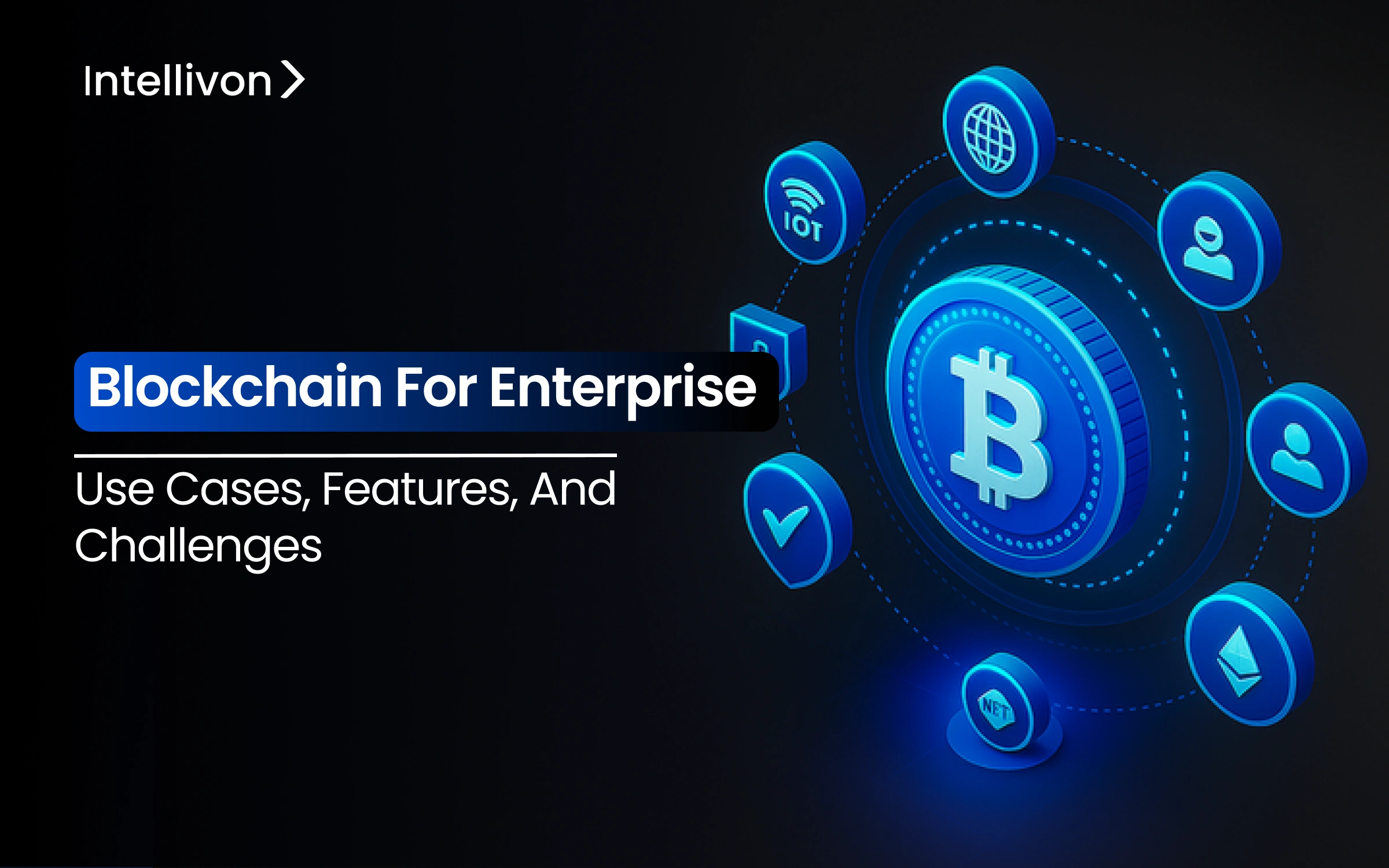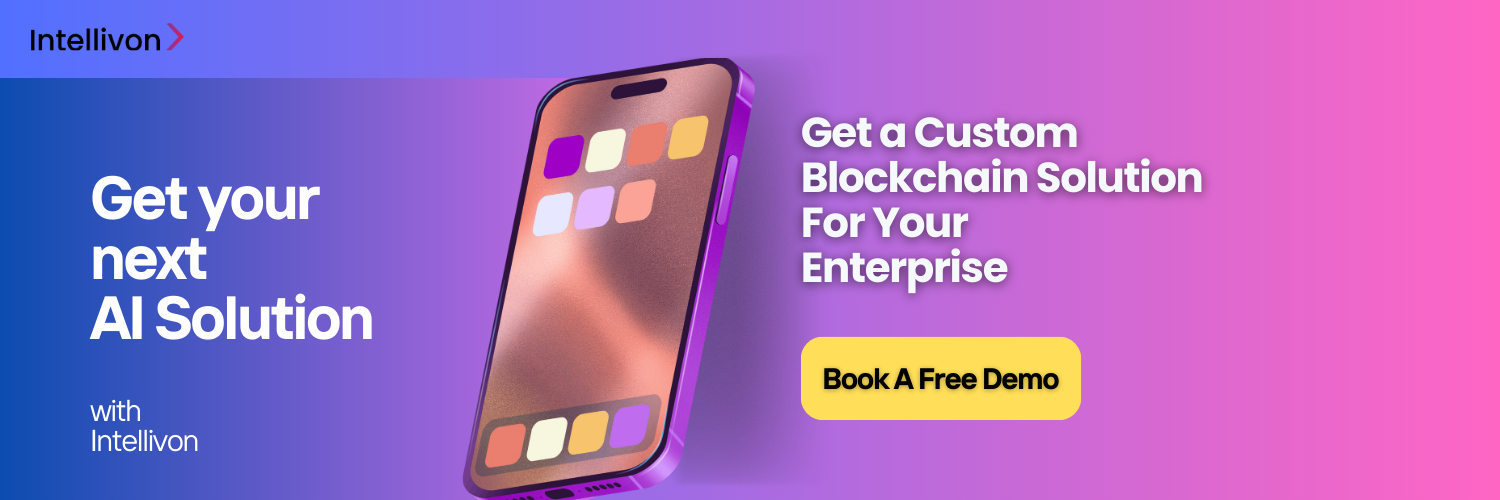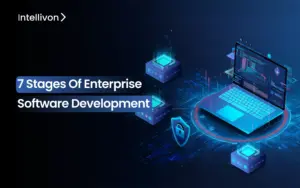Enterprise blockchain is changing how organizations work across various industries. It’s important for decision-makers to grasp its potential. Today, many top companies use blockchain in some way. However, numerous organizations still struggle to turn blockchain’s promise into actual use. This gap shows the need for a clear understanding of where blockchain provides real value.
Unlike public cryptocurrencies, enterprise blockchain focuses on privacy, scalability, and compliance. This approach ensures it can integrate smoothly with ERP and CRM systems.
Leading companies that have used Intellivon’s blockchain solutions have reported a twofold increase in ROI and improved platform usage. This blog looks at successful enterprise use cases, the main features that make blockchain scalable, and the challenges organizations need to tackle for successful adoption.
Key Takeaways of the Enterprise Blockchain Market
The global enterprise blockchain market is projected to grow from approximately USD 14.14 billion in 2024 to more than USD 213.40 billion by 2031, representing a compound annual growth rate (CAGR) of over 47%, according to market.us.
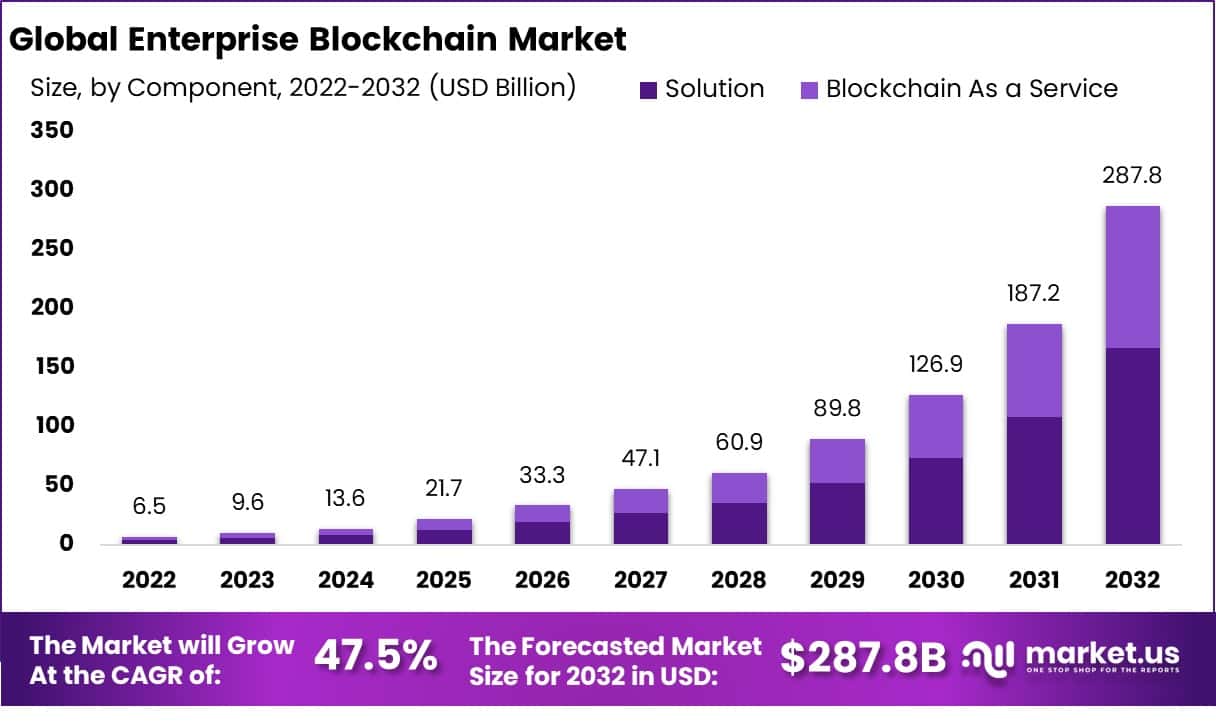
Key Growth Trends:
- Around 58% of enterprise blockchain initiatives are focused on data protection and secure information sharing, as businesses demand permissioned networks to safeguard sensitive data.
- The financial services sector leads adoption, holding more than 41% of total revenue share, with use cases in fraud prevention, transaction security, and smart contracts.
- In North America, nearly 46% of supply chain companies have already adopted or are in the process of adopting blockchain to enhance operational visibility and efficiency.
- Within healthcare, blockchain could help the industry save up to USD 100 billion per year by minimizing fraud and improving efficiency in data exchange and patient record management.
- Blockchain-powered health insurance platforms are projected to cut fraudulent claims by 75%, saving the sector approximately USD 25 billion annually.
Enterprise blockchain is quickly moving into the mainstream, with 70% of global organizations expected to adopt the technology by 2026. Industries such as supply chain, finance, and healthcare are leveraging blockchain for real-time tracking, secure data exchange, and more transparent operations.
For instance, Maersk, in collaboration with IBM, developed the TradeLens blockchain platform to digitize and streamline global shipping logistics. By replacing paper-heavy processes with blockchain-powered smart documentation, Maersk significantly reduced processing times, administrative costs, and shipping delays, while giving all stakeholders real-time visibility into cargo movements. This not only improved efficiency and accountability but also set new standards for transparency across international trade networks.
Main Types of Blockchain Networks
Not all blockchains are built the same way. Depending on how they are structured, governed, and accessed, blockchain networks fall into four main categories. For enterprises, understanding these distinctions is crucial because the right type of blockchain directly impacts security, scalability, and collaboration potential.
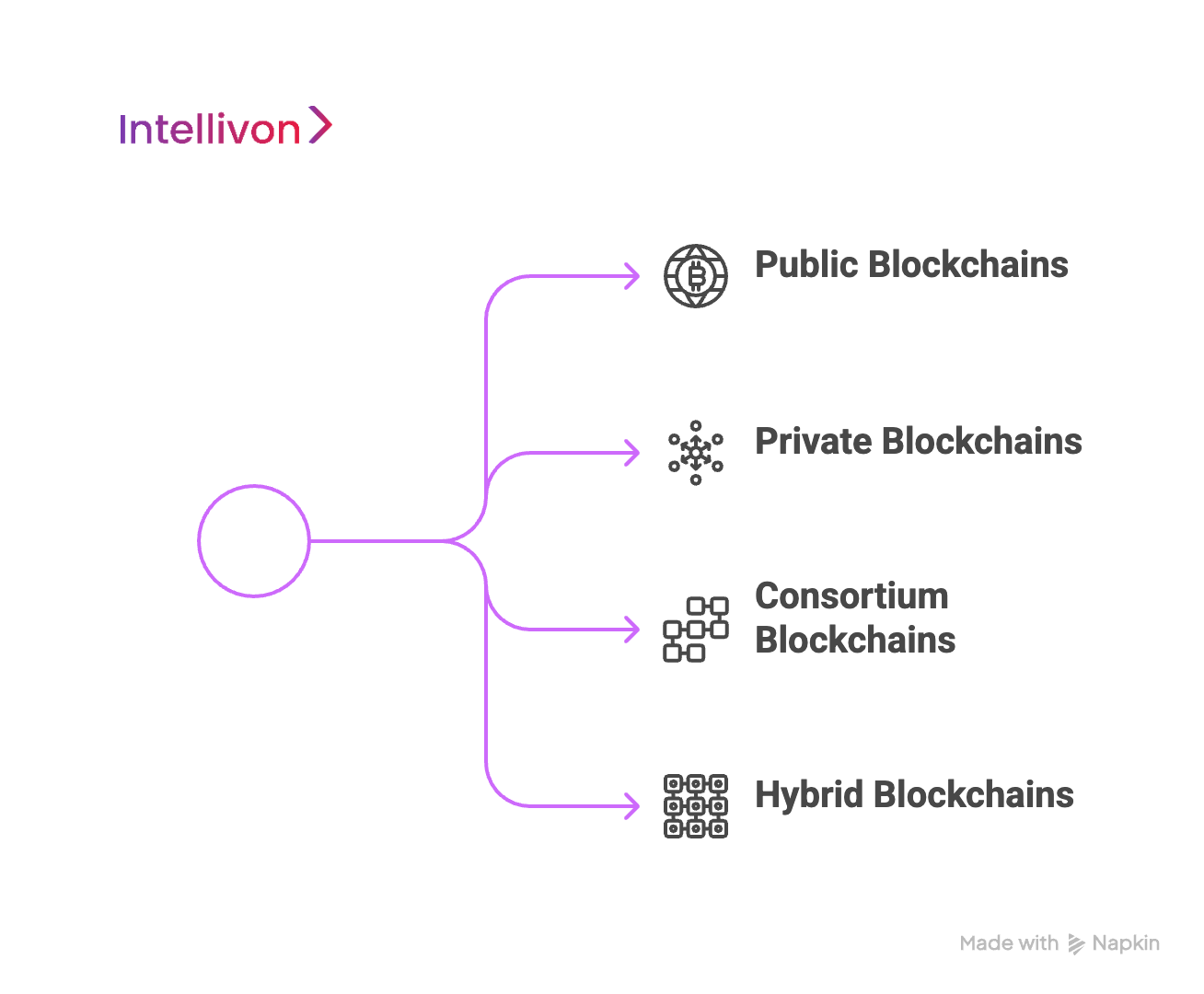
1. Public Blockchains
Public blockchains are open and permissionless, meaning anyone can join the network, validate transactions, and build applications on top of it. These are the most decentralized form of blockchain, offering transparency and security backed by large-scale consensus.
- Examples: Bitcoin, Ethereum
- Best for: Cryptocurrencies, decentralized finance (DeFi), and dApps where trust must be distributed across a global ecosystem.
For enterprises, while public blockchains provide unmatched transparency, they may face challenges in speed, cost, and privacy, making them less suited for sensitive internal operations.
2. Private Blockchains
Unlike public blockchains, private blockchains are restricted and permissioned, usually controlled by a single organization. Only approved participants can access, validate, or modify the network.
- Examples: Hyperledger Fabric, R3 Corda
- Best for: Enterprises managing supply chain tracking, secure auditing, or compliance-heavy industries like banking and insurance.
Private blockchains offer higher performance and privacy but trade off decentralization. They’re ideal when an enterprise wants strong internal control over its blockchain infrastructure.
3. Consortium Blockchains
Consortium blockchains bring multiple organizations together under a shared governance model. Rather than being controlled by a single entity, they distribute authority among a group of stakeholders.
- Examples: Energy Web Foundation, IBM Food Trust
- Best for: Industry collaborations such as banking consortia, healthcare data exchanges, or logistics partnerships where competitors must cooperate but still maintain trust.
Consortium networks balance decentralization with efficiency, making them particularly attractive for enterprises aiming to collaborate without ceding full control to external parties.
4. Hybrid Blockchains
Hybrid blockchains combine the best of both public and private systems. They allow enterprises to maintain privacy and control over critical data while opening select processes to public transparency.
- Examples: Dragonchain, XinFin
- Best for: Government services, retail ecosystems, and large enterprises that need selective transparency while safeguarding sensitive information.
This model is becoming increasingly popular in enterprise adoption because it balances security, scalability, and trust without compromising operational efficiency.
Key Features of A Scalable Enterprise Blockchain Solution
When businesses assess blockchain platforms, scalability is usually the key factor. A solution needs to manage high transaction volumes, safeguard sensitive data, and work with existing systems. It must also maintain speed and security. Here are the essential features that define a truly scalable enterprise blockchain.
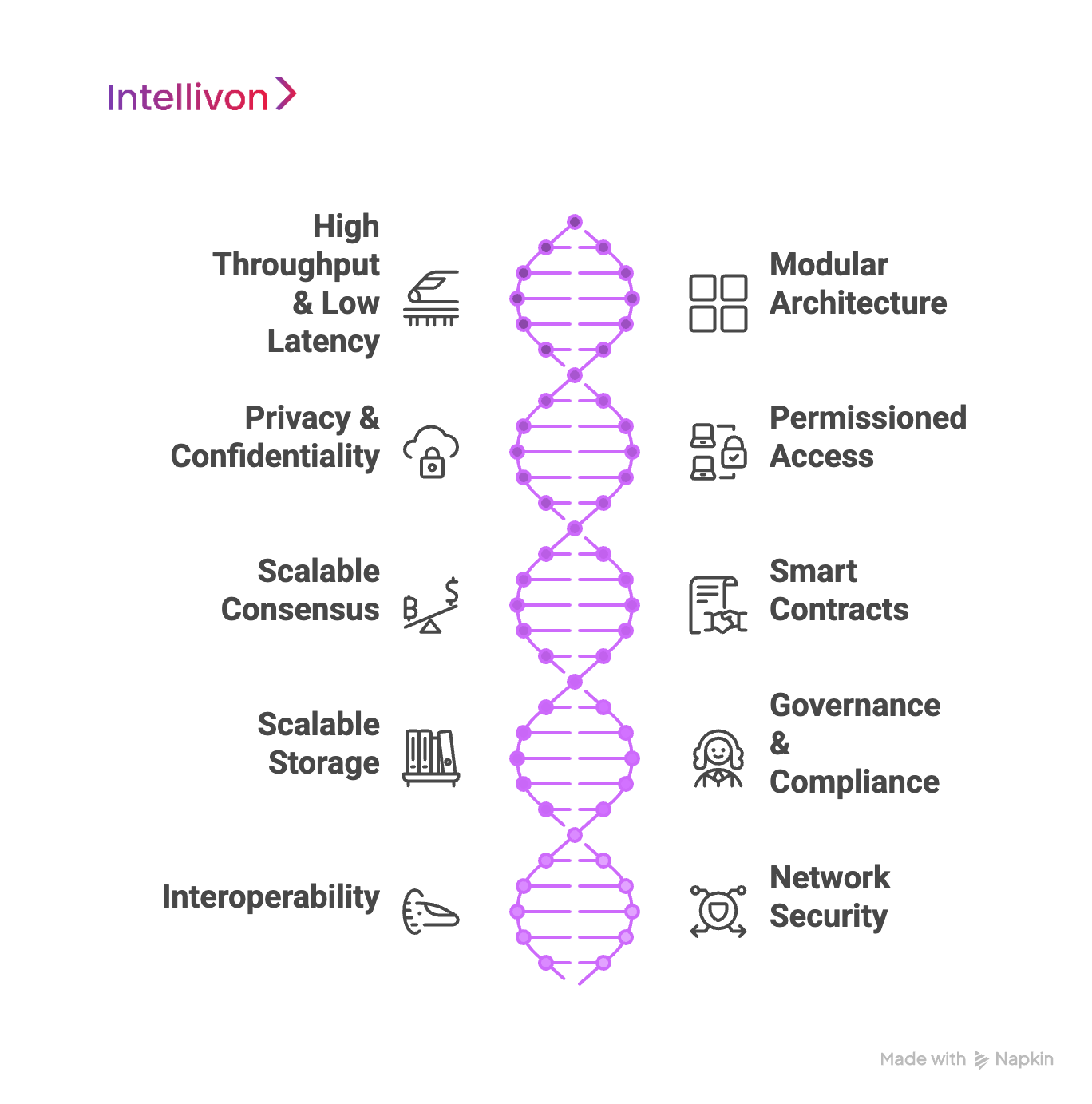
1. High Throughput and Low Latency
Large organizations need a network that can process thousands of transactions per second without delay. High throughput ensures smooth operations, while low latency keeps confirmations near real-time, that is essential for industries where instant updates drive competitive advantage.
Key capabilities:
- Ability to handle thousands of TPS
- Low block confirmation times for fast decision-making
2. Modular and Flexible Architecture
Every enterprise has unique needs. A modular blockchain architecture lets organizations customize features, add integrations, or even swap consensus mechanisms as they scale.
Key capabilities:
- Customizable modules for privacy, governance, or consensus
- Interoperability with other blockchains and external systems
3. Privacy and Confidentiality
Blockchain transparency is valuable, but enterprises often deal with sensitive data. Scalable platforms must offer robust privacy controls to protect critical business information.
Key capabilities:
- Private transactions within permissioned networks
- Confidential smart contracts that safeguard logic and data
- Advanced encryption for data in transit and at rest
4. Permissioned Access
Unlike public blockchains, enterprise solutions need strict control over access and roles. Permissioned frameworks ensure compliance and protect internal operations.
Key capabilities:
- Role-based access control (RBAC)
- Enterprise-grade identity management tools, integrated with systems like LDAP or Active Directory
5. Scalable Consensus Mechanisms
Consensus is the backbone of blockchain. For enterprises, the right mechanism balances speed, security, and efficiency.
Key capabilities:
- Efficient models such as PoA or PBFT for permissioned networks
- Sharding for parallel transaction processing
- Hybrid consensus for diverse business requirements
6. Smart Contract Functionality
Smart contracts power automation. A scalable platform must support complex workflows while keeping security intact.
Key capabilities:
- Support for advanced programming languages (e.g., Solidity, Go)
- Upgradable smart contracts to adapt to evolving needs
- Seamless workflow integration with enterprise systems
7. Scalable Storage and Data Management
As networks expand, so does the data. Scalable blockchains use efficient storage strategies to prevent bottlenecks.
Key capabilities:
- Off-chain storage linked to on-chain records
- Integration with IPFS or Swarm for decentralized file storage
- Efficient indexing for fast queries
8. Governance and Compliance Tools
Enterprises operate in regulated environments. Blockchain solutions must include built-in governance and compliance features to ensure trust and auditability.
Key capabilities:
- On-chain governance for stakeholder voting
- Full audit trails of transactions and smart contracts
- Compliance with standards like GDPR, HIPAA, and financial regulations
9. Interoperability with Legacy Systems
Blockchain doesn’t exist in isolation. Enterprises need platforms that connect seamlessly with both internal systems and external chains.
Key capabilities:
- Cross-chain interoperability with Ethereum, Hyperledger, or Corda
- APIs for ERP, CRM, and supply chain systems
- Oracles for real-world data integration
10. Network Security and Attack Resistance
Security cannot be compromised. Scalable blockchains must defend against both technical and operational risks.
Key capabilities:
- Multi-signature support for secure approvals
- Zero-Knowledge Proofs (ZKPs) for private verification
- End-to-end encryption across the network
Building a scalable enterprise blockchain is about resilience, adaptability, and compliance. The features above provide the foundation for building platforms that can grow with an organization, integrate with complex IT ecosystems, and withstand future demands. Enterprises that prioritize these capabilities will be positioned to unlock blockchain’s full potential in a secure and future-ready way.
Key Industry Use Cases of Enterprise Blockchain Solutions
Blockchain technology has evolved from its origins in cryptocurrency to become a major force for innovation in numerous industries. In 2025, blockchain is being adopted across various sectors to improve transparency, security, efficiency, and trust. Let’s dive deeper into how this technology is transforming key industries.
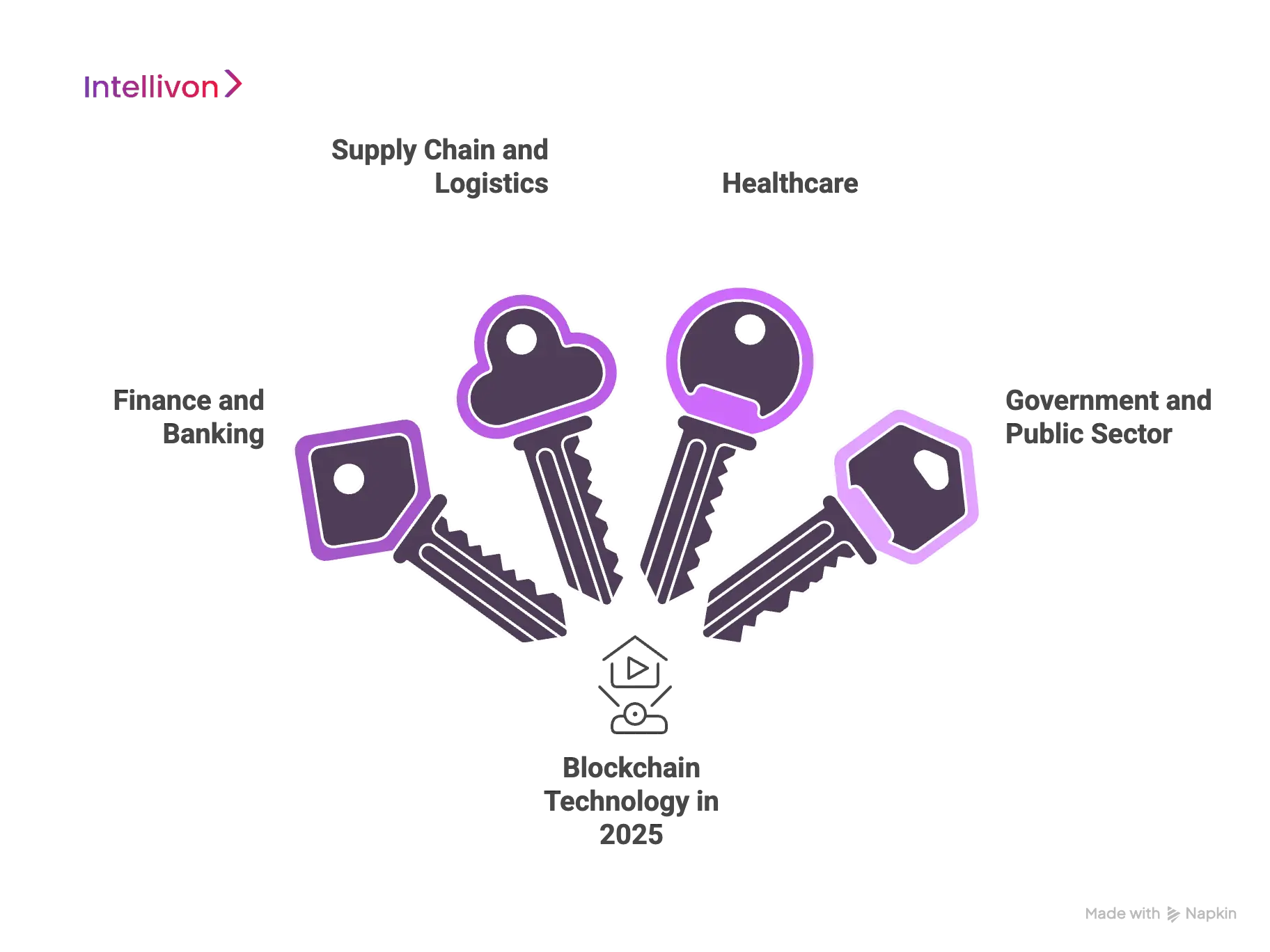
1. Finance and Banking
Blockchain is playing a pivotal role in reshaping the finance and banking sectors. Its impact is particularly evident in reducing fraud, improving payment systems, and streamlining trade finance.
- Reducing Fraud: Blockchain’s immutable nature ensures that once a transaction is recorded, it cannot be altered. This feature drastically reduces the risk of fraudulent activities, especially in financial transactions. By making all transaction records visible and immutable, blockchain provides a layer of security that traditional systems cannot match.
- Improving Payment Systems: Traditional payment methods often involve multiple intermediaries, leading to higher costs and delays. Blockchain removes these intermediaries, reducing transaction fees and making cross-border payments faster. For example, Ripple’s blockchain network is already being used by banks worldwide to make instant, low-cost international payments.
- Enabling Trade Finance: In global trade, blockchain enables greater transparency and efficiency. By using smart contracts, banks can automate trade transactions, reducing paperwork and the time it takes to process deals.
Blockchain adoption in the financial sector is already growing rapidly, with major financial institutions like JPMorgan, Citigroup, and Goldman Sachs exploring and implementing blockchain technology in their operations.
2. Supply Chain and Logistics
Blockchain’s influence on supply chain management is undeniable. By offering transparent, secure, and real-time tracking of goods, it has revolutionized logistics across various industries.
- Enhancing Transparency: Blockchain ensures complete visibility into the supply chain. Each transaction, shipment, and product detail is recorded on a decentralized ledger. This transparency allows all participants in the supply chain to access real-time data, reducing discrepancies and errors.
- Improving Traceability: In industries like food, pharmaceuticals, and luxury goods, product traceability is crucial. Blockchain enables goods to be traced from their origin to the end customer, ensuring authenticity and quality. This is particularly useful for preventing counterfeiting and ensuring that products comply with safety standards.
- Streamlining Operations: Blockchain automates and simplifies complex processes in logistics. Smart contracts can be used to automatically execute certain actions (such as confirming delivery or releasing payment), cutting down on manual effort and reducing delays. This automation leads to greater efficiency and cost savings across the supply chain.
For example, Walmart uses blockchain to trace food products from their origin to the shelf, reducing the time it takes to trace a product from days to just seconds. This enhances food safety and ensures faster responses during recalls, increasing customer confidence in product quality.
3. Healthcare
Blockchain technology has the potential to address several critical issues in the healthcare industry, particularly around data security, interoperability, and administrative efficiency.
- Securing Patient Data: Blockchain offers an effective solution by creating an encrypted, decentralized ledger that ensures only authorized users can access sensitive data. This reduces the risk of data breaches and ensures compliance with data protection regulations, such as GDPR and HIPAA.
- Improving Interoperability: Healthcare providers often struggle with interoperability, meaning that different healthcare systems don’t communicate well with each other. Blockchain allows for secure, standardized data exchange across various platforms. This facilitates better coordination of care, especially for patients who visit multiple healthcare providers.
- Streamlining Processes: Blockchain can streamline administrative tasks, such as billing and claims processing, which are often complex and prone to error. By automating these processes through smart contracts, blockchain reduces the time spent on manual work and minimizes the potential for fraud. Furthermore, it ensures that all transactions are traceable and auditable.
As blockchain adoption grows, healthcare organizations are seeing improved patient care, lower administrative costs, and better regulatory compliance.
4. Government and Public Sector
Blockchain has the potential to transform the public sector by enhancing transparency, securing digital identities, and improving governance.
- Improving Governance: Governments can use blockchain to create tamper-proof records of all transactions, such as tax filings, public spending, and voting. This leads to greater transparency and accountability in public administration, reducing corruption and increasing public trust in government institutions.
- Enhancing Digital Identity: Blockchain enables the creation of secure and verifiable digital identities, which can be used for accessing government services such as social welfare, voting, or filing taxes. These digital identities are much harder to counterfeit compared to traditional paper-based or even digital systems.
- Managing Public Records: The public sector deals with vast amounts of records, from land titles to court documents. Blockchain’s immutable ledger ensures that these records cannot be tampered with, providing a reliable, transparent, and auditable system for managing public documents.
Countries like Estonia have already implemented blockchain technology in their e-governance systems, enabling citizens to securely vote online, access health records, and manage public services through digital identities.
5. Emerging Industries
In addition to the major industries mentioned above, blockchain is making significant strides in several emerging sectors:
- Retail: Blockchain is revolutionizing the retail industry by providing transparent supply chains, authenticating products, and enhancing loyalty programs. Retailers can offer consumers verifiable information about a product’s origin and quality, which builds customer trust. Blockchain-based loyalty programs are also gaining traction, offering consumers rewards that are more easily transferable and secure.
- Real Estate: Blockchain is simplifying real estate transactions through tokenization, which allows property ownership to be represented by digital tokens. This reduces the time and cost associated with property transactions, making them more accessible and transparent. Smart contracts can also be used to automate aspects of property deals, further streamlining the process.
- Legal: Blockchain is transforming the legal industry by enabling smart contracts that automatically execute when certain conditions are met. This reduces the need for intermediaries and minimizes the chances of disputes. Additionally, blockchain can be used to store and verify legal documents, ensuring their authenticity and preventing fraud.
As more enterprises adopt blockchain solutions, we can expect these industries to continue evolving and benefiting from the innovation blockchain brings.
Benefits of using Blockchain Solutions for Enterprises
Blockchain is becoming an essential technology for enterprises because it solves problems that traditional systems cannot. From security to efficiency, blockchain gives organizations the tools they need to function in a fast, transparent, and secure digital economy. Let’s look at the key benefits driving adoption.
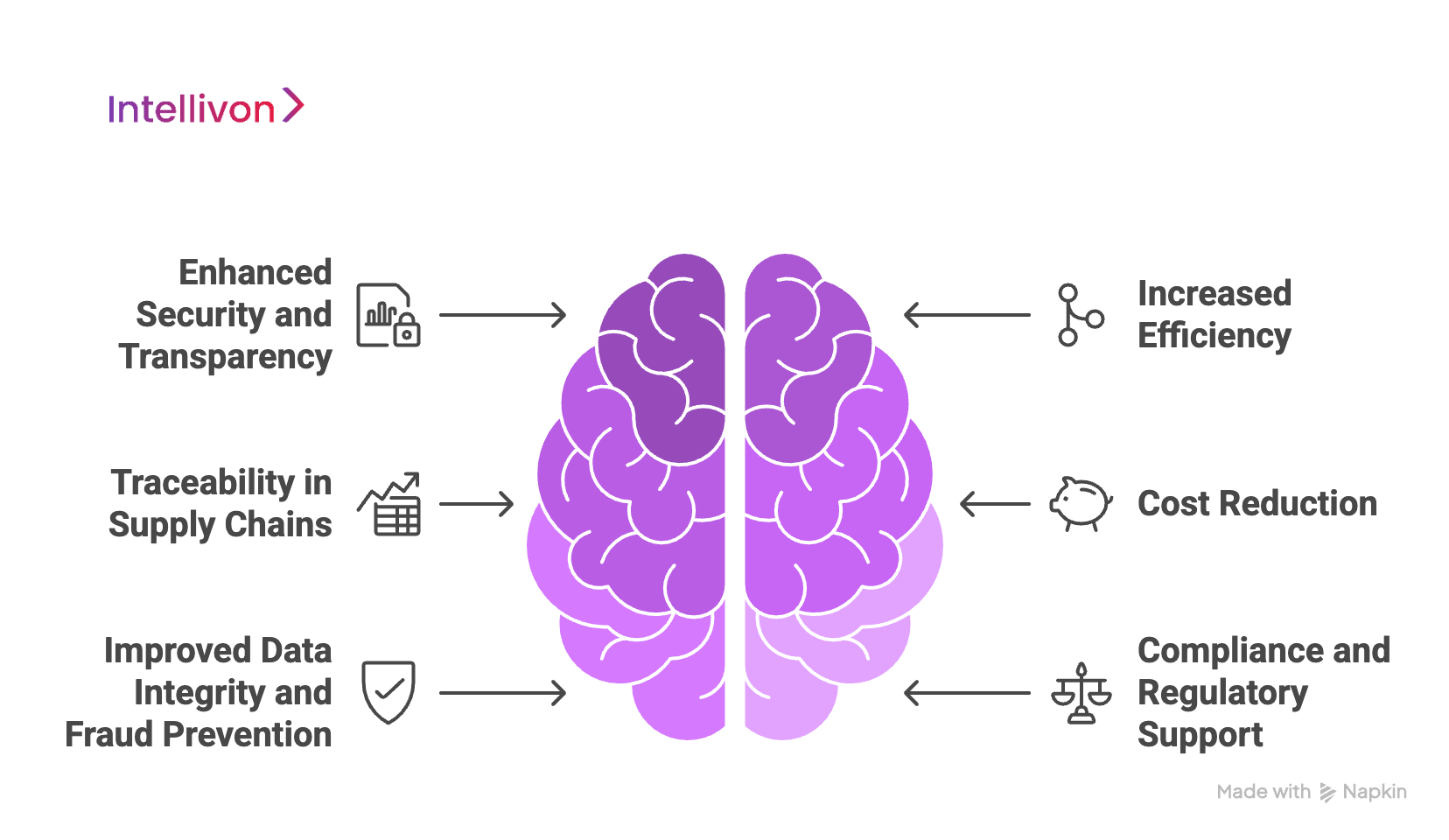
1. Enhanced Security and Transparency
One of blockchain’s strongest advantages is its ability to secure sensitive information. Once data is added, it cannot be changed or deleted, creating a permanent record. This immutability, combined with cryptographic protection, prevents unauthorized access and fraud.
Industries such as finance, healthcare, and supply chain management benefit most, as they deal with highly sensitive information. The added transparency also allows stakeholders to independently verify data, which builds trust across the ecosystem.
2. Increased Efficiency
Blockchain reduces inefficiencies by cutting out middlemen. Traditional transactions often involve intermediaries like banks or brokers, which add costs and delays. With blockchain, parties can transact directly.
Smart contracts further improve efficiency by automating agreements and executing them once predefined conditions are met. In supply chains, this automation speeds up order fulfillment, reduces errors, and lowers operational costs.
3. Traceability in Supply Chains
For industries where compliance and product authenticity are critical, blockchain provides unmatched traceability. Every step in a product’s journey, from production to delivery, can be recorded and verified.
This is particularly useful in sectors like pharmaceuticals, agriculture, and retail, where counterfeit products pose significant risks. For example, pharmaceutical companies can track drugs through the supply chain to ensure patients receive genuine and safe products.
4. Cost Reduction
Enterprises are constantly looking for ways to reduce overheads, and blockchain delivers on that promise. By eliminating the need for third-party validators and streamlining processes, businesses can cut down transaction fees and reduce manual labor.
In financial services, cross-border payments that traditionally take days and incur high fees can now be completed in minutes at a fraction of the cost. Major institutions are already embracing blockchain-powered payment systems to lower expenses.
5. Improved Data Integrity and Fraud Prevention
Data integrity is another area where blockchain excels. Transactions are validated with digital signatures and stored on an immutable ledger, which makes tampering virtually impossible.
In industries such as healthcare, medical records can be updated securely by authorized staff but remain protected from unauthorized edits. This combination of transparency and security reduces the risk of fraud and ensures accurate data management.
6. Compliance and Regulatory Support
Enterprises in regulated industries face constant compliance challenges. Blockchain simplifies this by offering transparent audit trails and even automating compliance through smart contracts.
Regulatory authorities can also use blockchain to track financial transactions in real time, ensuring adherence to rules like KYC (Know Your Customer) and AML (Anti-Money Laundering). For businesses, this reduces the risk of penalties and makes audits smoother.
Top 5 Enterprise Blockchain Platforms
Here are the top 5 enterprise blockchain solutions in 2025 at a glance:
Feature Comparison Table At A Glance
| Blockchain Platform | Consensus Mechanism | Privacy Features | Ideal Use Cases | Notable Users |
| R3 Corda | Pluggable Consensus | Strong Privacy & Regulation | Trade finance, banking, insurance | JP Morgan, BNP Paribas |
| Hyperledger Fabric | Flexible Consensus (PBFT, Kafka) | Private Channels, Advanced Security | Supply chain, healthcare, logistics | Walmart, IBM |
| XDC Network | Delegated Proof of Stake (DPoS) | Moderate Privacy | Trade finance, ERP systems | Various APAC businesses |
| Hedera Hashgraph | Asynchronous Byzantine Fault Tolerance (aBFT) | High Security, Public & Private Access | Digital identity, micropayments, supply chain | Google, IBM, Boeing |
| Quorum | Istanbul BFT | Enhanced Privacy (with zero-knowledge proofs) | Asset tokenization, financial services | JPMorgan Chase, Microsoft |
1. R3 Corda
R3 Corda is a permissioned blockchain platform tailored for the financial sector, though it has expanded its reach into other industries like insurance and trade finance. Its primary strength lies in providing a secure and transparent ledger that complies with regulatory requirements, making it the go-to solution for financial institutions.
Key Features
- Pluggable Consensus: R3 Corda’s consensus mechanism is flexible, allowing businesses to select the one that best suits their needs, whether it’s proof-of-work (PoW) or another variant.
- Privacy: The platform enables strong privacy controls, allowing parties to only see the transactions that are relevant to them.
- Regulatory Compliance: R3 Corda meets the stringent compliance requirements of financial industries, making it ideal for institutions that need to maintain transparency and follow global regulations.
Use Cases
R3 Corda has made significant strides in trade finance, banking, and insurance. It’s used to streamline complex financial processes, including cross-border payments and contract management. For example, R3 Corda’s smart contract functionality is often used in trade finance for automating letters of credit.
Why It’s Perfect for Financial Institutions
R3 Corda was built with financial institutions in mind. Its strong emphasis on compliance, privacy, and flexibility makes it ideal for institutions that need to ensure data integrity and security while adhering to strict regulatory guidelines.
Real-World Case Studies
R3 Corda has partnered with major financial players like JP Morgan and BNP Paribas to enable seamless, secure transactions and digital contract management in the banking sector. Its role in trade finance has simplified cross-border trade and reduced the risk of fraud.
2. Hyperledger Fabric
Hyperledger Fabric is a flexible, open-source blockchain platform designed for enterprise use, particularly in sectors like supply chain management and healthcare. Unlike other platforms, Fabric allows businesses to customize their blockchain solution to fit specific needs.
Key Features
- Flexible Consensus: Hyperledger Fabric uses pluggable consensus mechanisms, such as PBFT (Practical Byzantine Fault Tolerance) and Kafka, making it adaptable for different enterprise needs.
- Private Channels: It offers private channels, enabling different participants in a network to engage in private, secure transactions without revealing sensitive information to the entire network.
- Advanced Security: Hyperledger Fabric provides high-level encryption and authentication to secure sensitive data and prevent unauthorized access.
Use Cases
Hyperledger Fabric excels in supply chain management, healthcare, and logistics. In these sectors, Fabric is used to improve data visibility, trace product origins, and ensure regulatory compliance. For example, Walmart uses Hyperledger Fabric to trace food products, improving food safety and recall efficiency.
Why It’s Ideal for Enterprise Applications
Hyperledger Fabric is highly scalable and customizable, making it ideal for large enterprises. Its modular architecture allows businesses to tailor the blockchain system according to specific requirements, making it a top choice for companies with unique operational needs.
Case Studies
IBM and Walmart are major adopters of Hyperledger Fabric, using it for supply chain visibility. Walmart tracks over 25 product lines through the blockchain, and IBM uses it to streamline operations in healthcare and logistics.
3. XDC Network
The XDC Network is a hybrid blockchain platform, combining both public and private blockchains. It is designed to support high-speed, cross-border payments and enterprise resource planning (ERP) systems.
Key Features
- Delegated Proof of Stake (DPoS): XDC Network uses DPoS to achieve high-speed, low-cost transactions with secure and trusted consensus.
- Cross-Chain Interoperability: XDC supports cross-chain transactions, which makes it compatible with other blockchain networks, allowing for seamless integration.
Use Cases
XDC is most commonly used in trade finance and ERP systems. It facilitates fast and secure cross-border payments and enables businesses to use blockchain for data management, ensuring transparency and security across financial transactions.
Why It’s Gaining Popularity in APAC
XDC’s ability to handle cross-border payments efficiently has made it especially popular in Asia-Pacific (APAC) markets, where international trade is prevalent. It’s becoming a trusted solution for businesses seeking to enhance their trade finance systems.
Real-World Adoption
Mitsubishi UFJ Financial Group (MUFG), one of Japan’s largest financial institutions, has integrated the XDC Network to enhance its cross-border payment capabilities, improving the speed and security of international transactions.
4. Hedera Hashgraph
Hedera Hashgraph is a high-performance alternative to traditional blockchains, offering fast transactions and a unique consensus algorithm called Asynchronous Byzantine Fault Tolerance (aBFT). It is well-suited for enterprises that require speed and scalability.
Key Features
- aBFT: Hedera Hashgraph’s consensus mechanism provides greater speed and security than traditional blockchains, enabling the network to process thousands of transactions per second.
- Scalability: Hedera is designed to scale effortlessly, handling high transaction volumes without slowing down the network.
Use Cases
Hedera is widely used in digital identity, micropayments, and supply chain tracking. The Google-backed platform offers enterprises a secure, efficient way to process real-time payments and manage data.
Why It’s Different from Traditional Blockchain
Unlike traditional blockchain, Hedera Hashgraph is not limited by the inherent scalability issues seen in popular blockchains like Bitcoin or Ethereum. Its unique algorithm enables faster processing and a more secure platform for enterprises.
Notable Partners
Hedera’s enterprise adoption includes major players like Google, IBM, and Boeing, which leverage its speed and performance for various enterprise applications.
5. Quorum
Quorum is an enterprise-grade version of Ethereum, designed to offer the same functionality as Ethereum while adding enhanced privacy and a permissioned network suitable for enterprise use.
Key Features
- Ethereum Compatibility: Quorum is built on Ethereum, making it compatible with Ethereum’s vast ecosystem of tools and applications.
- Enhanced Privacy: Quorum implements privacy features like zero-knowledge proofs, ensuring that sensitive transaction data is kept confidential.
Use Cases
Quorum is ideal for asset tokenization, financial services, and data sharing. It has been used by financial institutions to manage internal transactions securely and transparently.
Why Quorum is Ideal for Financial Institutions
Quorum’s permissioned network and advanced privacy features make it perfect for financial institutions like JPMorgan Chase, which uses Quorum for internal settlements and tokenized assets.
Innovative Projects on Quorum
One of the most notable projects on Quorum is JPMorgan’s JPM Coin, which is used for instantaneous payments between institutional clients. The platform is also gaining traction for tokenized securities and other blockchain-based financial services.
Our Technical Suite For Robust Enterprise Blockchain Solutions
At Intellivon, we recognize that building enterprise-grade blockchain applications requires more than just innovation. From smart contract development to scalable infrastructure, our suite of tools and APIs empowers businesses to build secure, efficient, and reliable blockchain solutions tailored for enterprise adoption.
1. Blockchain Development Frameworks
Frameworks form the backbone of blockchain development, enabling seamless contract creation, testing, and deployment.
Truffle Suite remains one of the most trusted environments for Ethereum-based projects. It offers everything developers need—from compiling and deploying contracts, to running local simulations with Ganache, and even integrating front-end workflows with Drizzle. For example, organizations building secure e-voting platforms can rely on Truffle to design and test contracts that guarantee both transparency and accuracy.
Ganache, often used alongside Truffle, provides a local blockchain that simulates real-world conditions such as transaction costs or congestion. This makes it ideal for supply chain solutions, where every process can be tested repeatedly in a controlled environment before live deployment.
Hardhat has become the developer favorite for more complex applications, such as DeFi and large-scale dApps. With its advanced debugging tools, detailed error tracing, and plugin ecosystem, Hardhat allows enterprises to test contract interactions in depth, ensuring systems are reliable before scaling.
2. APIs for Integration and Connectivity
For blockchain to deliver real business value, it must connect seamlessly with enterprise systems. That’s where our API solutions come in.
Web3.js is the go-to JavaScript library for interacting with Ethereum. It enables applications to handle transactions, deploy contracts, and pull blockchain data directly into user interfaces.
For enterprises that prioritize speed and efficiency, ethers.js offers a lighter, more modern alternative. With strong cryptographic tools and lower overhead, it is particularly effective in mobile-first environments, such as crowdfunding or microfinance platforms where speed and trust are critical.
Meanwhile, Infura takes the complexity out of infrastructure by providing secure, cloud-hosted Ethereum and IPFS nodes. Enterprises can focus on scaling their applications without the cost and maintenance of running blockchain nodes themselves. For instance, digital marketplaces can use Infura to support high transaction volumes with zero downtime.
3. Smart Contract Security and Development
Smart contracts are the core of blockchain applications, and security cannot be compromised.
With OpenZeppelin, we provide enterprises with access to prebuilt, community-audited contracts for token issuance, access control, and upgradeable deployments. These contracts follow best practices, allowing businesses to accelerate development while maintaining the highest standards of trust and reliability.
For rapid prototyping, Remix IDE offers a browser-based environment where teams can quickly write, test, and debug contracts. Enterprises often use Remix to experiment with new models before pushing them into production environments.
4. Deployment and Management Tools
Scaling blockchain applications requires more than development, it requires enterprise-ready infrastructure.
Alchemy provides the backbone for our deployment ecosystem. With high-performance APIs, advanced monitoring, and real-time analytics, Alchemy ensures that enterprise dApps can run at scale without performance issues. Supporting multiple blockchains, it allows businesses to explore cross-chain innovation while guaranteeing speed and stability. For example, content-driven platforms can use Alchemy to manage digital rights and creator payments across millions of users with zero compromise on performance.
By bringing together these tools, Intellivon delivers a technical suite that simplifies blockchain adoption and accelerates innovation. From frameworks like Truffle, Hardhat, and Ganache, to connectivity APIs like Web3.js, ethers.js, and Infura, and infrastructure support from OpenZeppelin, Remix, and Alchemy, we use these to build scalable blockchain solutions for enterprises that are secure, scalable, and future-ready.
Our Process for Building Enterprise Blockchain Solutions
At Intellivon, we use a systematic approach to design and deliver blockchain solutions that align with your enterprise goals. Each step is crafted to ensure the final solution is secure, scalable, and seamlessly integrated into your existing infrastructure. Here’s how we do it:
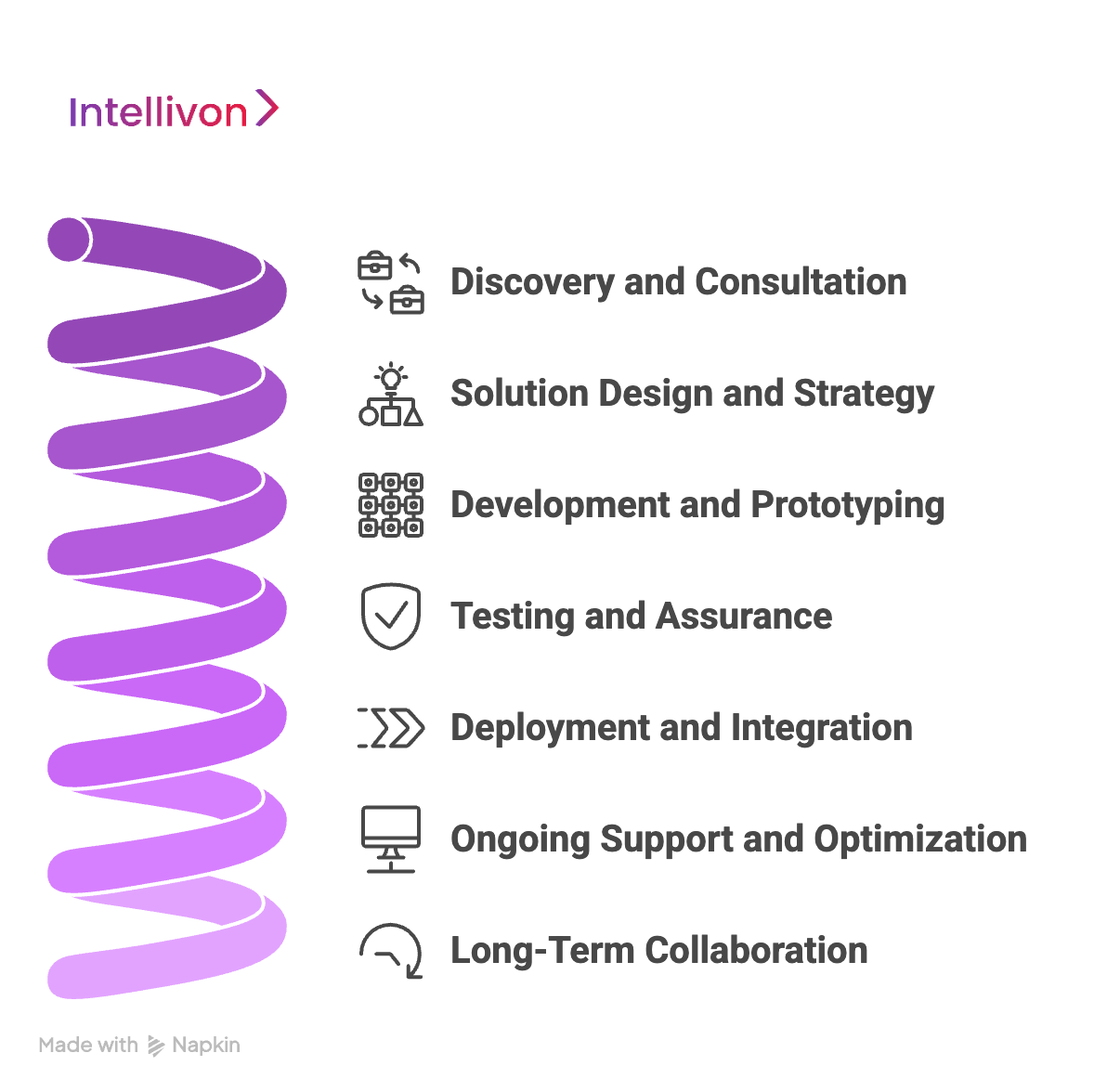
Step 1: Discovery and Consultation
We begin with an in-depth consultation to understand your business landscape, challenges, and long-term goals. This stage allows us to identify pain points where blockchain can add the most value, whether it’s boosting efficiency, enhancing transparency, or strengthening data security. Together, we define clear objectives to make sure the solution aligns with your strategic vision.
Step 2: Solution Design and Strategy
With a solid understanding of your requirements, we move on to designing the blockchain framework. This involves choosing the right blockchain type (permissioned or permissionless), consensus mechanism, and smart contract functionality tailored to your use cases.
In some cases, we create a Proof of Concept (PoC) to validate the idea before moving into full-scale development.
Step 3: Development and Prototyping
Once the strategy is finalized, our development team builds the blockchain solution. We focus on designing smart contracts that automate processes and ensure compliance with predefined rules.
At the same time, we integrate the blockchain with your existing systems like ERP, CRM, or other business applications. Using agile methods, we prototype, test, and refine to make sure the solution adapts well to evolving business needs.
Step 4: Testing and Assurance
Before going live, we run extensive testing to guarantee that the system is secure, stable, and high-performing. This includes security audits, performance testing under heavy loads, and user acceptance testing (UAT) to ensure it meets organizational expectations.
Step 5: Deployment and Integration
After successful testing, we move to deployment. Our team ensures a smooth rollout with minimal impact on existing operations. We also manage data migration, ensuring legacy data is accurately and securely transferred to the blockchain without loss or downtime.
Step 6: Ongoing Support and Optimization
Our work doesn’t stop at deployment. We continuously monitor system performance, resolve issues, and make scalability adjustments to support higher transaction volumes as your business grows. This ensures the solution remains reliable, secure, and optimized.
Step 7: Long-Term Collaboration
At Intellivon, we see ourselves as a long-term partner, not just a service provider. We work with you to implement upgrades, adopt new features, and incorporate emerging blockchain innovations. This way, your blockchain solution evolves with your business, ensuring long-term value and relevance.
If you’re ready to explore how blockchain can transform your business, contact our experts today. We’ll guide you through every step of implementing a customized blockchain solution tailored to your enterprise’s needs.
Roadblocks To Enterprise Blockchain Adoption and Solutions
Deploying blockchain into enterprise functions is rarely a straightforward journey. Between technical challenges, security risks, integration with legacy systems, and the complexity of scaling, many organizations struggle to unlock blockchain’s full potential. At Intellivon, we recognize these challenges firsthand, and more importantly, we specialize in overcoming them.
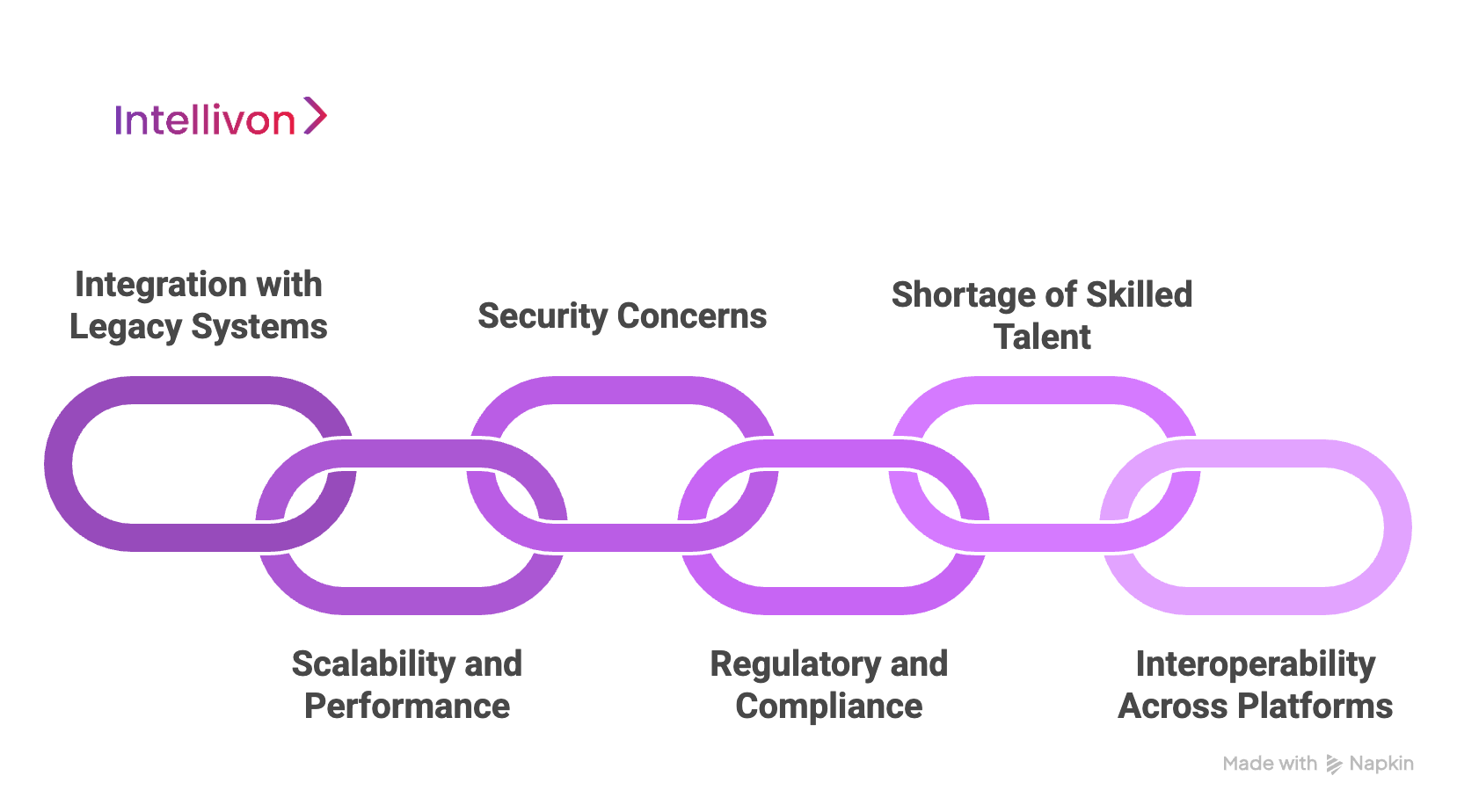
1. Integration with Legacy Systems
Most enterprises still run on legacy IT infrastructure built around centralized databases and ERP or CRM platforms. These systems were never designed to communicate with decentralized ledgers, which makes integration difficult. Data migration is another major hurdle, as blockchain’s immutability requires precision in how information is structured and stored.
Our Solution:
At Intellivon, we bridge this gap by deploying hybrid models that connect blockchain with traditional systems through secure APIs and middleware. We also follow a phased integration approach, starting with non-critical systems and gradually scaling, ensuring that your transition to blockchain is seamless and disruption-free.
2. Scalability and Performance
Public blockchains often cannot handle the transaction volume, speed, and low-latency requirements of large enterprises. Issues like throughput limitations and network congestion lead to slow processing and high transaction fees.
Our Solution:
To solve this, we deploy private and permissioned blockchains such as Hyperledger Fabric and Corda, which provide better scalability, faster transaction speeds, and lower costs. Where required, we integrate sharding and Layer 2 solutions that allow transactions to scale without compromising security. This ensures your blockchain applications remain agile and capable of handling enterprise-level demands.
3. Security Concerns
While blockchain is inherently secure, vulnerabilities often arise in smart contracts or integration points with external systems. Poorly written contracts can lead to costly exploits, while data transparency sometimes clashes with enterprise requirements for confidentiality.
Our Solution:
Intellivon tackles these concerns with comprehensive smart contract audits and ongoing security assessments. We also implement advanced technologies like Zero-Knowledge Proofs to ensure sensitive data remains private without sacrificing transparency. For organizations requiring greater confidentiality, we design permissioned networks with role-based access controls.
4. Regulatory and Compliance Challenges
Enterprises in finance, healthcare, and supply chain face strict regulatory requirements, and blockchain adoption must comply with evolving laws across multiple jurisdictions. Ambiguity in regulations, especially in cross-border contexts, can create additional hurdles.
Our Solution:
Our team works closely with legal and compliance experts to align blockchain deployments with global standards, from GDPR to HIPAA. By using permissioned networks, we help organizations maintain control over data access, ensuring regulatory compliance while benefiting from blockchain innovation.
5. Shortage of Skilled Talent
Blockchain development requires highly specialized knowledge, like cryptography, consensus mechanisms, and smart contract coding, to name a few. Many enterprises lack in-house expertise, making adoption costly and time-consuming.
Our Solution:
At Intellivon, we remove this barrier by providing end-to-end development expertise. From architecture design to deployment, we bring a dedicated team of blockchain engineers, security analysts, and integration specialists who manage the full lifecycle of your project.
For enterprises looking to build internal capacity, we also provide training programs to upskill existing teams.
6. Interoperability Across Platforms
The blockchain ecosystem is fragmented, with platforms like Ethereum, Hyperledger, and Corda each having their own standards. Without interoperability, enterprises risk creating data silos that limit collaboration and scalability.
Our Solution:
We solve this by implementing cross-chain bridges and oracles that enable your systems to communicate seamlessly across multiple blockchains and external applications. This ensures your blockchain solution is not just functional but also future-proof, capable of adapting to new ecosystems as they emerge.
Blockchain adoption in the enterprise world is complex, but with the right partner, these challenges become opportunities. At Intellivon, we specialize in navigating integration, scalability, compliance, and adoption barriers. If your organization is exploring blockchain, partner with us to ensure a smooth, strategic, and successful implementation.
Conclusion
Blockchain is set to change businesses in 2025 and beyond. With new trends like AI integration, cross-chain interoperability, and decentralized finance, companies will find fresh chances for innovation, security, and efficiency.
As blockchain keeps evolving, it will be important for businesses to stay ahead of these trends. This will help them stay competitive and make the most of this groundbreaking technology.
Build Your Next Blockchain-Powered Enterprise Solution With Us
Developing a blockchain solution for your enterprise is about creating a secure, scalable, and efficient system that drives innovation and supports long-term growth. With our expertise in blockchain technology and a proven track record of successful enterprise implementations, we are the trusted partner for building customized blockchain solutions that deliver tangible business value.
Why Choose Us for Blockchain Solutions?
- Tailored Blockchain Architecture: Custom-designed to meet your business objectives and industry-specific needs.
- Seamless Integration: Smooth integration with your existing ERP, CRM, and legacy systems.
- Enterprise-Grade Security: Solutions built with top-tier security standards to protect your data and ensure compliance.
- Scalability for Growth: Blockchain solutions that grow with your business, supporting high transaction volumes and data complexity.
- Continuous Support & Training: Comprehensive training for your team and ongoing support to ensure smooth operation.
Our blockchain experts are ready to help you:
- Define your blockchain strategy and objectives.
- Design a tailored blockchain solution for your enterprise.
- Ensure compliance with industry regulations.
- Develop, test, and deploy your blockchain system with continuous monitoring and support.
Book a free consultation to discuss how blockchain can revolutionize your business. Let’s build the secure, scalable, and future-ready blockchain solution your enterprise needs.
FAQ’s
Q1. How can blockchain benefit enterprises beyond cryptocurrency?
A1. Blockchain offers enterprises far more than digital currency applications. It enables secure data sharing, tamper-proof recordkeeping, real-time tracking across supply chains, automation of processes through smart contracts, and improved transparency for audits and compliance.
Q2. What are the key steps in implementing a blockchain solution for a business?
The process typically involves consultation and discovery, solution design, development and prototyping, testing, deployment with system integration, and ongoing support. Each step ensures that the blockchain system is secure, scalable, and aligned with business objectives.
3. Which blockchain platforms are best suited for enterprises?
Popular enterprise-grade platforms include Hyperledger Fabric, R3 Corda, and Ethereum. The right choice depends on whether a company needs a permissioned or permissionless system, scalability requirements, and integration with existing infrastructure.
4. How does blockchain improve security for enterprises?
Blockchain enhances security by using encryption, decentralized ledgers, and consensus mechanisms that make data tampering nearly impossible. Enterprises benefit from immutable records, reduced fraud risks, and greater trust in multi-party transactions.
5. What kind of support do enterprises need after deploying a blockchain solution?
Enterprises require post-deployment support such as performance monitoring, system optimization, scalability upgrades, and troubleshooting. Since blockchain technology evolves rapidly, ongoing support ensures that the solution continues to deliver long-term business value.

